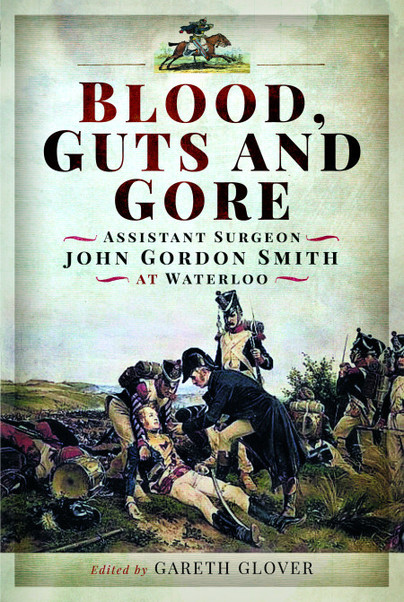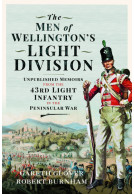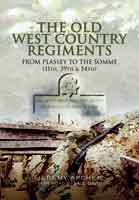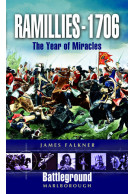Blood, Guts and Gore (Hardback)
Assistant Surgeon John Gordon Smith at Waterloo
Imprint: Pen & Sword Military
Pages: 264
Illustrations: 17 colour
ISBN: 9781399097215
Published: 16th September 2022
(click here for international delivery rates)
Order within the next 8 minutes to get your order processed the next working day!
Need a currency converter? Check XE.com for live rates
| Other formats available - Buy the Hardback and get the eBook for £1.99! | Price |
|---|---|
| Blood, Guts and Gore ePub (17.0 MB) Add to Basket | £6.99 |
John Gordon Smith wrote one of the most vivid, honest and readable personal accounts of the Battle of Waterloo and the ensuing campaign, where he served as a surgeon in the12th Light Dragoons, but his classic narrative was only published in a limited edition in the 1830s and since then it has been virtually unknown. His warts-and-all depiction of the British army in Belgium and France and the fighting at Waterloo rivals many of the more famous and often reprinted military memoirs of the period. That is why Gareth Glover, one of the foremost experts on the battle and the archive sources relating to it, has sought to republish the narrative now, with a full introduction and explanatory notes.
Smith’s account reads like a novel, in a chatty, easy-going style, but it often records deeply shocking scenes and behaviour so scandalous that he had to avoid naming names. As well as recalling, in graphic detail, his experience as a medic during the battle, he records the aftermath, the allied occupation of France. His writing, which describes the truly dreadful consequences of the fighting as only a surgeon would see them, also gives the reader a rare insight into his role and a memorable impression of the life in the army as a whole.
John Gordon Smith qualified as a doctor in Edinburgh in 1810 and began his army medical career as a hospital mate on 25 April 1811. He became an assistant surgeon to the 11th Light Dragoons in March 1813 and transferred to the 12th Light Dragoons in October of the same year serving in the Peninsular War. In 1815, with the 12th Light Dragoons, he served in Belgium during the Waterloo campaign and the occupation of France that followed. In 1818 he was placed on half pay and he never returned to military service. He published the two volume The English Army at Waterloo and in France in 1830 and died in London in September 1833.
This book is a condensed version of part of Dr Gordon Smith’s life, commencing with the account of his role during the Waterloo Campaign and life after the war as a junior surgeon in the 12th Light Dragoons. Gareth Glover, the experienced editor, has reduced the original narrative from c. 135,000 words, omitting much irrelevant travelogue. Smith’s experiences in the Peninsular and later civilian career are not addressed. After return from Europe, Smith pursued a tenuous career then a potentially successful practice in medical jurisprudence, but died in a debtor’s prison, aged just 41, presumably of some infectious disease.
Michael Crumplin October 2022, The Napoleon Series
There are plenty of helpful footnotes from editor and author. Day-to-day events, relationships, lodgings, horsemanship, and the travels of a junior surgeon are described in some detail and occasionally, even in the Georgian dialect, descriptions can be a trifle obscure. Smith is well-read, educated and reading between the lines, a committed and capable doctor.
He gives us a unique and valuable view into the 1st Corps dressing station at Mont St Jean during and after the 18 June 1815. He has a minor bȇte noir in the form of his junior surgical colleague in the regiment, who often stimulates criticism from the author. Smith comments widely on the characters witnessed during his sojourn in the Army of Occupation. The text is littered with regimental anecdotes.
Sadly, for the medical historian and in the way of several other similar accounts by Georgian military medical men, the book omits useful medical and surgical detail, which would perhaps have given the book title more relevance. This snapshot into Smith’s experiences seem remarkably well recalled after 15 years, give an engaging insight into the life of a junior surgeon in Wellington’s army.
This book is little more than a fascinating insight into one man’s experiences and thereby to an understanding of soldiering in that time...We warmly recommend it to a wide range of readership.
Clash of Steel
Read the Full Review Here
3 out of 5
Army Rumour Service (ARRSE)
As featured on Army Rumour Service
Well done to Pen and Sword for resurrecting the memoirs of surgeon John Gordon Smith at the battle of Waterloo!
Books Monthly
This is a single volume edition of a very rare memoir which appeared originally in two volumes in 1830. Gareth Glover has removed much irrelevant material, adopted a new, simpler and more relevant system of ten chapters, and provides extensive footnotes to the text, many of which reveal the real names of people whose identities Smith concealed by using only initials, themselves often false, either to avoid embarrassing them or the threat of litigation.
Arthur Harman, Miniature Wargames
A two-page Preface gives concise biographical details of Smith’s life: after graduating in medicine from Edinburgh University in 1810, he entered the army as a Hospital Mate in 1811, became Assistant Surgeon of the 11th Light Dragoons in March 1813, transferred to the 12th Light Dragoons October 1813, served with them at Waterloo, where he continued caring for the wounded at Mont St Jean farmhouse for some days before rejoining the regiment on the road to Paris, and retired from the army on half-pay in December 1818.
Smith did not publish his recollections of the Waterloo campaign and the Army of Occupation of France until 1830. As he died in a debtor’s prison in September 1833, after fifteen months’ confinement, it is possible that he produced the book in an attempt to ward off poverty, hoping it would prove as popular as the memoirs of other British officers, but was disappointed.
The recollections begin with the news that Napoleon had escaped from Elba, the 12th Light Dragoons being ordered on foreign service, embarking at Ramsgate and landing at Ostend, and end when Smith returned Ramsgate in 1818. Chapters four to eight cover the campaign, the battle of Waterloo and the subsequent treatment of the wounded at Mont St Jean farm. Chapter seven also contains the account of Lieutenant Colonel Frederick Ponsonby, who commanded the 12th Light Dragoons, inserted by Mr Glover to explain the references to his fate in Smith’s narrative.
The remaining chapters, covering the March to Paris and Smith’s time in the Army of Occupation, are full of anecdotes, such as an elopement and the ‘court-martial’ and punishment of a rat caught “reconnoitring the sideboard” in the mess-house that illustrate the off-duty behaviour of British officers and might provide ideas for a roleplaying game.
Eight pages of colour plates in the centre of the book include contemporary portraits of Sir Frederick Ponsonby and Captain William Hay of the 12th Light Dragoons, a painting of a private of that regiment by Denis Dighton, and photographs of Ponsonby’s Waterloo sword, the Waterloo Memorial to the 12th Light Dragoons and a Surgeon’s Regulation Case and instruments, c. 1812. A full-page colour plate shows a British Army Staff Surgeon and an Inspector of Hospitals.
The dustjacket illustration, however, shows a French medical officer and troops assisting a wounded French officer! The new title – the original was The English Army at Waterloo and in France - is both unnecessarily sensationalist and does not reflect the way in which Smith describes the soldiers’ wounds and their treatment.
A half-page bibliography and a two-page index conclude the book.
Smith’s account of Waterloo offers a very important perspective on battle during the Napoleonic Wars - the fate of the wounded – that we wargamers should never forget while leading our miniature troops to glorious victories in bloodless tabletop battles.
John Gordon Smith was a surgeon with the 12th Light Dragons in the Battle of Waterloo. This book is his story in his own words. His journal entries were published in 1830 but this is the first time since they are being published in their entirety. Many stories were so scandalous that real names weren't used. Interesting stuff!
NetGalley, Brenda Carleton
Physical and mental suffering were rife in war and many anecdotes are described here from the suffering of the regiment, horrific wounds and surgery, effects of weather, food, lodging, alcohol, disease, deserters, illness and those who were invalided. So many stories stood out to me but a few are those of the horses eating wheat and regimental stamps on horses, cutting off limbs, what needed to be done with bodies and women collecting their dead men. Smith's writing is engaging and fascinating with its vivid imagery and multi-sensory descriptions of his harrowing experiences. It is impossible to fathom what soldiers suffered.
Military History fans would really appreciate this book. It is very detailed and in depth and as such quite genre specific, though I enjoyed it as a rabid History reader. I am pleased to have learned a lot about the battlefield in general as well as various weaponry used.
My sincere thank you to Pen & Sword and NetGalley for the privilege of reading this fascinating book.
An interesting and invaluable historical book from a military surgeon acting as an eye-witness in the battle of Waterloo.
NetGalley, ALEXIOS PAPADOPOULOS
Detailed depiction of the 1800's, the era, the preparations, the people of Belgium and France, the difficulties and setbacks he encountered, the battle, the aftermath, the occupation of France.
A really important personal record of that time
As featured in
The Bookseller
An amazing piece of history which has been faithfully and cleverly edited so as to be accessible to a modern audience. For fans of social history, true accounts obscure perspectives, this publisher always delivers, and this book is a perfect example.
NetGalley, Louise Gray
Rating: 5 out of 5 stars
NetGalley, Lynn Beck
Incredibly interesting nonfiction book about battle surgery and medicine. Any history lover will absolutely need this book.
This book actually delivers far more than at first sight might be imagined. The personal account of the aftermath of Waterloo is all the better for being only focused on the problem of the injured and the dead. Also the information that Smith gives about the harsh realities of human behaviours is totally within the context of the overall narrative especially regarding the conduct of some soldiers on the advance to Paris. The narrative was originally written with all people anonymised but the fine detective work by Gareth Glover has revealed the true names of the participants and thereby increased the value of the narrative. It is also enhanced by the copious footnotes that are as good to read as the main text. Being written by an educated and articulate participant in the battle, a number of myths are corrected, not lease the origins of the observation tower near Rossomme.
Michael McCarthy
Michael McCarthy, Battlefield Guide
About Gareth Glover
Gareth Glover is a former Royal Navy officer and military historian who has made a special study of the Napoleonic Wars for the last thirty years. In addition to writing many articles on aspects of the subject in magazines and journals, his books include From Corunna to Waterloo, Eyewitness to the Peninsular War and the Battle of Waterloo, An Eloquent Soldier, fourteen volumes of The Waterloo Archive, Waterloo: Myth and Reality, The Forgotten War Against Napoleon: Conflict in the Mediterranean 1793-1815, The Two Battles of Copenhagen 1801 and 1807: Britain and Denmark in the Napoleonic Wars and Marching, Fighting, Dying: Experiences of Soldiers in the Peninsular War.





















